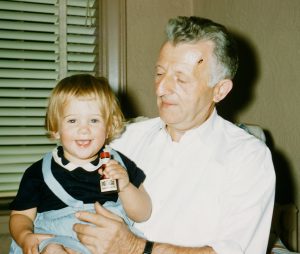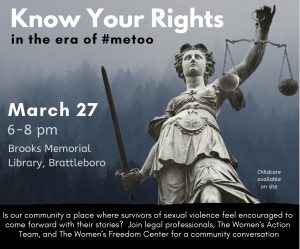
I have more to say about my grandfather since last fall, when I wrote both about him sexually abusing me and about Vermont Public Radio not allowing me to say so.
First of all, admitting this abuse took place has helped me see the long half-life of childhood, familial, sexual abuse on my personality and the damaging effects of my subsequent half-century of silence.
Secondly, I learned how that abuse groomed me to be taken advantage of. So I’m perversely grateful to the radio station for protecting my grandfather at my expense, because I finally recognized this as the sort of abuse by people in power that I’ve allowed throughout my life – until now.
What to do with old photos?
Recently, my brothers, husband and children went through my parents’ thousands of slides, deciding which to digitize. We came across photos of this grandfather. Each time his likeness appeared on the screen, my oldest brother asked, “Your call,” leaving it to me to decide if we should keep this image or not.
There was an image of him holding me as a child – long before the abuse began. And images of him later in life, after it stopped.
I felt pressure to delete this photo from the family archive, thinking that was the right thing to do.
“Scrap it,” I said.
It turned out that it was easier to digitize the entire carousel of slides rather than cherry pick the ones we’d selected to keep. And I was relieved that the images of this man survive. Because as much as I hate what he did, I loved him. And this is what can make such intimate abuse so confusing and hard.
I was his only granddaughter until the very end of his life, and he was kind to me. He taught me how to draw by copying the cartoons out of The New Yorker. Even though he controlled his diabetes with a strict diet, he helped me bake, gladly washing the dishes, and without even tasting whatever I’d made would say, “It tastes delicious – I can tell by just looking!”
I loved him. He abused me.
In no way do I condone his abuse, but neither do I want to erase the time before. It feels as important to say, “I loved him,” as it is to say, “He abused me.” This is part of what makes familial abuse so confusing and confession feel like betrayal. But when is ordinary human behavior only good or evil? And if we erase the good with the bad, what else do we lose?
The short answer: our humanity.
Community Conversation

Sponsored by the Women’s Action Committee and the Women’s Freedom Center, the event aims is to create a community where people are not afraid to come forward with their stories.
The best way to change a culture that denies sexual abuse is to talk about it. Please join me for a Community Conversation to learn about speaking up publically about experiences of sexual harm.
Join the conversation with legal professionals, advocates and activists on Wednesday, March 27 from 6 – 8 pm at Brooks Memorial Library in Brattleboro. Childcare available on-site.
Thank your for these words of wisdom. We do “love” through the “abuse.” Unless you have been there, most folks do not understand how this can be. We all need to understand this dichotomy. Thank you!
Deborah: Although I can’t walk in your shoes, I admire your courage to speak out about actions that have hurt you. As a past supporter of VPR, I now question how this organization is run and whether or not its values are in alignment with mine and the people I admire and respect. One potential positive outcome is that VPR realizes its error and the harm its action inflicted, resulting in a real apology evidenced by a change in policy.
It became clear during my correspondence with the station that they do not have a clear (or any) policy about a situation like mine – nor to my knowledge have they crafted one since. I’ve withdrawn my financial support and have had no further contact with VPR. The great benefit of speaking out is that I will no longer let myself be abused. Thanks for reading and commenting on the post. All best, D.
Quite thought provoking and very generous of you to share this. Mixed feelings for a person who has brought harm to another, is so real and necessary to acknowledge.
Oh Deb I love this and love you. There is so little in human relations that is black and white. Thank you.